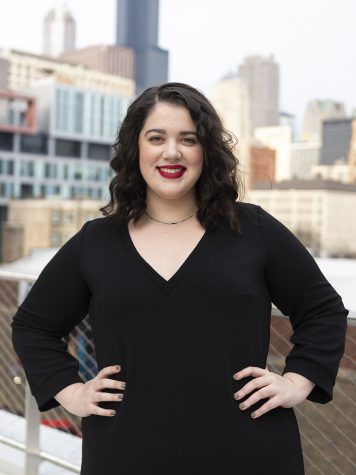Editor’s Note: This is our first draft of history. Let it have a good ending
May 11, 2020

Editor-in-Chief
(312) 369-8834
A common discussion in our newsroom for at least the past two years has been the value and role of the weekly print edition as we produce a steady stream of digital content throughout the week. It’s a debate many news outlets worldwide are having as advertising revenue declines for newspapers.
I had always been in favor of going entirely digital, but having to move to a remote newsroom over these past few weeks has left me melancholic for having a newspaper in my hands.
Our staff is so in love with producing a newspaper every week that some of us even smell the inky pages of our final product when it arrives in bulk on Monday mornings. We’ll notice if the colors were particularly vibrant that week, or perhaps if the paper was crisper or a different shade of white.
The weekly print issue was the light at the end of the tunnel for us. It was the summation of all our hard work and long hours from the prior week—a collective triumph of every person on staff. As the editor-in-chief, there was nothing as heartwarming as telling a reporter, a photojournalist or a graphic designer that their work was going to be on the front page—the creme de la creme of the issue.
Now—without a weekly print issue due to our staff working remotely and no campus community to deliver it to—there is nothing to smell on Monday mornings, and all of our work sometimes feels as though it has just been dropped into a bottomless void of digital content.
Though we’re proud of the vast improvement to our website and online coverage in the past year, I never thought I’d miss the 12 or more hours it took every Friday to put together 16 pages of paper. But I really do.
So, when the idea was brought up that we could produce a digital version of our print issue, it was an immediate “yes” from every editor.
After figuring out how we’d put it together remotely, we also decided that the issue should be a little different than how we usually put together our newspaper. Typically, our print editions operate as a “highlight reel” of all the best or most important content we produced the prior week.
Instead, we decided to pull together all of the most important pieces we have produced since the day the news broke that Columbia’s classes would be transitioned online.
As you digitally flip through these 38 pages, you’ll see in chronological order how everything transpired on Columbia’s campus and in Chicago. You’ll see the number of cases of the coronavirus rise nationally and citywide; you’ll see college administrators reverse decisions and announce sudden changes as the pandemic worsened; and you’ll see a sense of despair and hopelessness, not only from those we interviewed, but from Chronicle staffers in their own words.
But you’ll also see moments of light. You’ll see people coming together to help others; you’ll see recognition for the health care workers on the front line; you’ll see instructors and administrators bending over backward to ensure students are safe.
These few months are going to change everything. They will certainly change Columbia. Our role as students, instructors, staffers, alumni and parents is to make sure that Columbia comes out better than where we were on March 11.
Since moving back home with my dad after classes were canceled, he told me he was surprised that kids really don’t expect adults to have all the answers after hearing that in a training session for his teaching position.
Columbia—we don’t expect you to have all the answers. But we do expect you to be honest about when you don’t.
When the stay-at-home mandate has been lifted, the number of coronavirus cases flattens and in-person classes resume, I want to look back at these months and be able to say that my school handled it better than any other college because it put the students’ voices first. I want to be able to flip through this special issue and see everything that we as a community overcame.
As former publisher of The Washington Post, Philip Graham often repeated, “Journalism is the first rough draft of history.”
Well, this is our first draft. Please, let it have a good ending.







